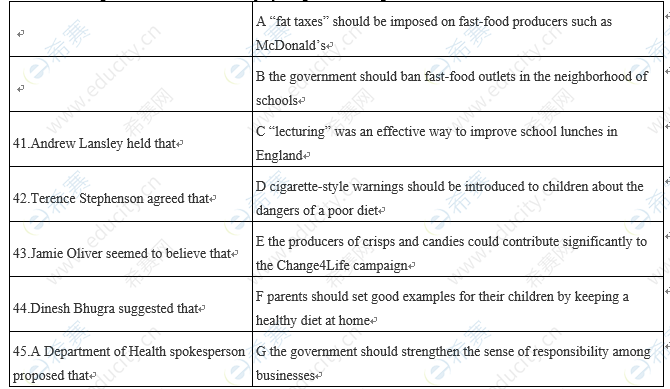2011年考研英語二新題型
摘要:考研英語真題是最好的復習資料,認真研讀近十年的考研英語真題將會收到極大的成效,多做真題,反復做真題,仔細推敲真題。以下是為大家分享的2011年全國碩士研究生入學統一考試英語二真題。更多考研英語真題相關資訊,請關注希賽網英語頻道。
Part B
Directions:
Read the following text and answer the questions by finding information from the right column that corresponds to each of the marked details given in the left column. There are twoextra choices in the right column. Mark your answer on ANSWER SHEET 1. (10points)
Leading doctors today weigh in on the debate over the government's role in promoting public health by demanding that ministers impose “fat taxes” on unhealthy food and introduce cigarette-style warnings to children about the dangers of a poor diet.
The demands follow comments made last week by the health secretary, Andrew Lansley, who insisted the government could not force people to make healthy choices and promised to free businesses from public health regulations.
But senior medical figures want to stop fast-food outlets opening near schools, restrict advertising of products high in fat, salt or sugar, and limit sponsorship of sports events by fastfood producers such as McDonald's.
They argue that government action is necessary to curb Britain's addiction to unhealthy food and help halt spiraling rates of obesity, diabetes and heart disease.Professor Terence Stephenson, president of the Royal College of Paediatrics and Child Health, said that the consumption of unhealthy food should be seen to be just as damaging as smoking or excessive drinking.
“Thirty years ago, it would have been inconceivable to have imagined a ban on smoking in the workplace or in pubs, and yet that is what we have now.Are we willing to be just as courageous in respect of obesity? I would suggest that we should be,” said the leader of the UK's children's doctors.
Lansley has alarmed health campaigners by suggesting he wants industry rather than government to take the lead. He said that manufacturers of crisps and candies could play a central role in the Chang for Life campaign, the centerpiece of government efforts to boost healthy eating and fitness. He has also criticized the celebrity chef Jamie Oliver's high-profile attempt to improve school lunches in England as an example of how “lecturing” people was not the best way to change their behavior.
Stephenson suggested potential restrictions could include banning TV advertisements for foods high in fat, salt or sugar before 9 pm and limiting them on billboards or in cinemas. “If we were really bold, we might even begin to think of high-calorie fast food in the same way as cigarettes—by setting strict limits on advertising, product placement and sponsorship of sports events,” he said.
Such a move could affect firms such as McDonald's, which sponsors the youth coaching scheme run by the Football Association. Fastfood chains should also stop offering “inducements” such as toys, cute animals and mobile phone credit to lure young customers, Stephenson said.
Professor Dinesh Bhugra, president of the Royal College of Psychiatrists, said: “If children are taught about the impact that food has on their growth, and that some things can harm, at least information is available up front.”
He also argues councils to impose “fast-food-free zones” around schools and hospitals—areas within which takeaways cannot open.
A department of Health spokesman said: “We need to create a new vision for public health where all of society works together to get healthy and live longer. This includes creating a new ‘responsibility, deal with business, built on social responsibly, not state regulation. Later this year, we will publish a white paper setting out exactly how we will achieve this.”
The food industry will be alarmed that such senior doctors back such radical moves, especially the call to use some of the tough tactics that have been deployed against smoking over the last decade.

答案:41-45EDCFG
延伸閱讀
- 2025年考研成績公布時間及查詢流程
- 2025年全國碩士研究生招生考試(初試)溫馨提示匯總
- 2025年全國碩士研究生招生考試考場規則
- 考研準考證數字代表什么
- 考研怎么知道自己在哪個考場
- 成人考研究生有年齡限制嗎?報名條件是怎樣的?

考研微信公眾號

考研備考資料免費領取
去領取
距離2025 考研考試
還有- 3
- 5
- 2








 專注在線職業教育24年
專注在線職業教育24年
 掃描二維碼
掃描二維碼
 掃描二維碼
掃描二維碼








